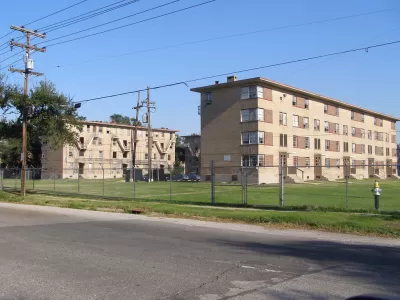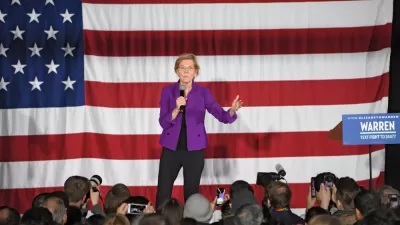Seeking repeal of the Faircloth Amendment could be a needless distraction in the new administration's efforts to create more affordable housing, according to an article by Jenny Schuetz for the Brookings Intitution.

In a piece published by the Brookings Institute, Jenny Schuetz argues that recent efforts by housing activists to repeal the Faircloth Amendment—a rule that limits the construction of public housing—are a distraction from the "more tangible obstacles to low-cost housing." Schuetz lists four reasons why public housing isn't the cure-all answer to the current housing crisis and suggests some effective ways to promote affordable housing.
- Local zoning that prohibits multi-family housing won't be affected by a repeal of the Faircloth Amendment. Without addressing zoning issues, public housing will remain segregated in areas with less political power and fewer resources.
- Many public agencies don't have the expertise or resources to manage large construction projects. "Today, nearly all new subsidized housing is built and managed by specialized nonprofit or for-profit developers. So, despite those calls for 'the government' to build more housing, most housing authorities don’t have the capacity or the desire to undertake new construction projects."
- Housing stock needs a long-term commitment to care and maintenance. Absent a long-range plan for funding maintenance and upgrades, public housing will fall into disrepair and place additional burdens on the low-income families who inhabit it.
- Other housing subsidies work better than building new public housing. Because subsidized housing tends to cost more to build than market-rate housing due to the complexity of the process, "increasing funds for housing vouchers or for the acquisition and rehabilitation of existing apartments" and "shoring up the long-term physical and financial viability of existing subsidized properties" would be more cost effective.
Schuetz acknowledges that making housing more affordable should be a priority of the Biden administration, but asserts that advocates should focus on more effective avenues for change than public housing.
FULL STORY: Four reasons why more public housing isn’t the solution to affordability concerns

Maui's Vacation Rental Debate Turns Ugly
Verbal attacks, misinformation campaigns and fistfights plague a high-stakes debate to convert thousands of vacation rentals into long-term housing.

Planetizen Federal Action Tracker
A weekly monitor of how Trump’s orders and actions are impacting planners and planning in America.

In Urban Planning, AI Prompting Could be the New Design Thinking
Creativity has long been key to great urban design. What if we see AI as our new creative partner?

Cal Fire Chatbot Fails to Answer Basic Questions
An AI chatbot designed to provide information about wildfires can’t answer questions about evacuation orders, among other problems.

What Happens if Trump Kills Section 8?
The Trump admin aims to slash federal rental aid by nearly half and shift distribution to states. Experts warn this could spike homelessness and destabilize communities nationwide.

Sean Duffy Targets Rainbow Crosswalks in Road Safety Efforts
Despite evidence that colorful crosswalks actually improve intersection safety — and the lack of almost any crosswalks at all on the nation’s most dangerous arterial roads — U.S. Transportation Secretary Duffy is calling on states to remove them.
Urban Design for Planners 1: Software Tools
This six-course series explores essential urban design concepts using open source software and equips planners with the tools they need to participate fully in the urban design process.
Planning for Universal Design
Learn the tools for implementing Universal Design in planning regulations.
Appalachian Highlands Housing Partners
Gallatin County Department of Planning & Community Development
Heyer Gruel & Associates PA
Mpact (founded as Rail~Volution)
City of Camden Redevelopment Agency
City of Astoria
City of Portland
City of Laramie





























